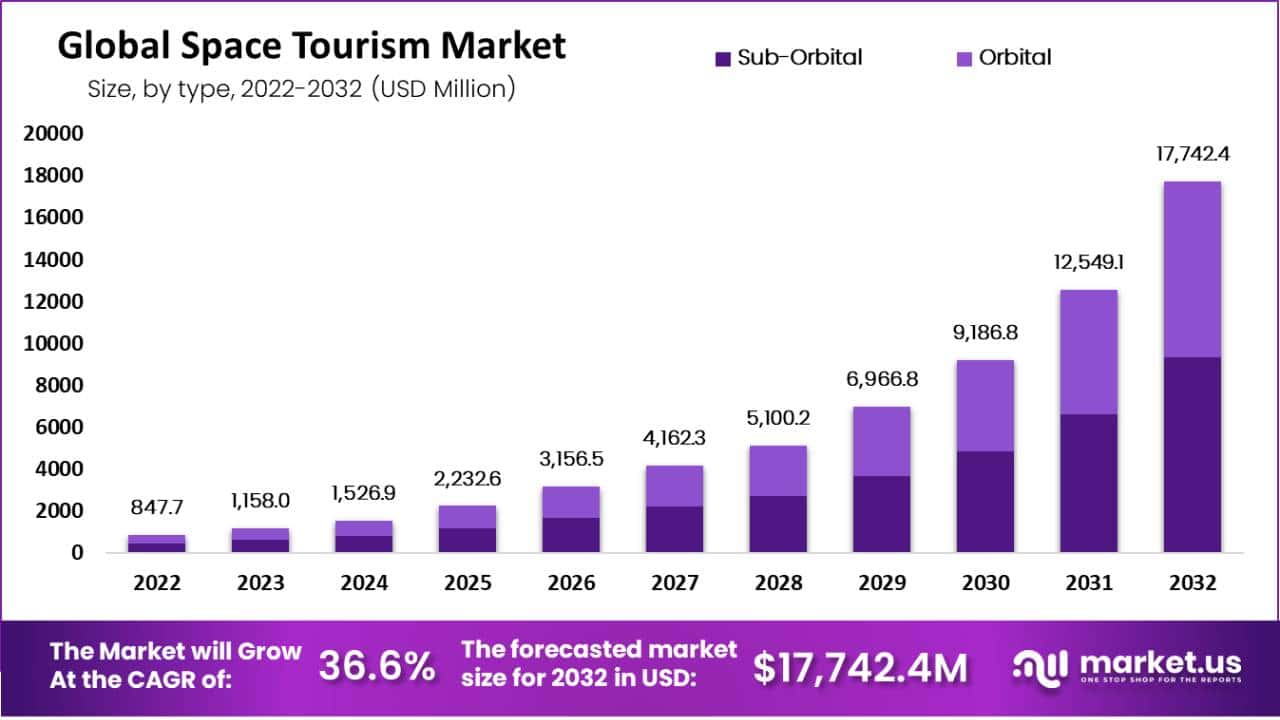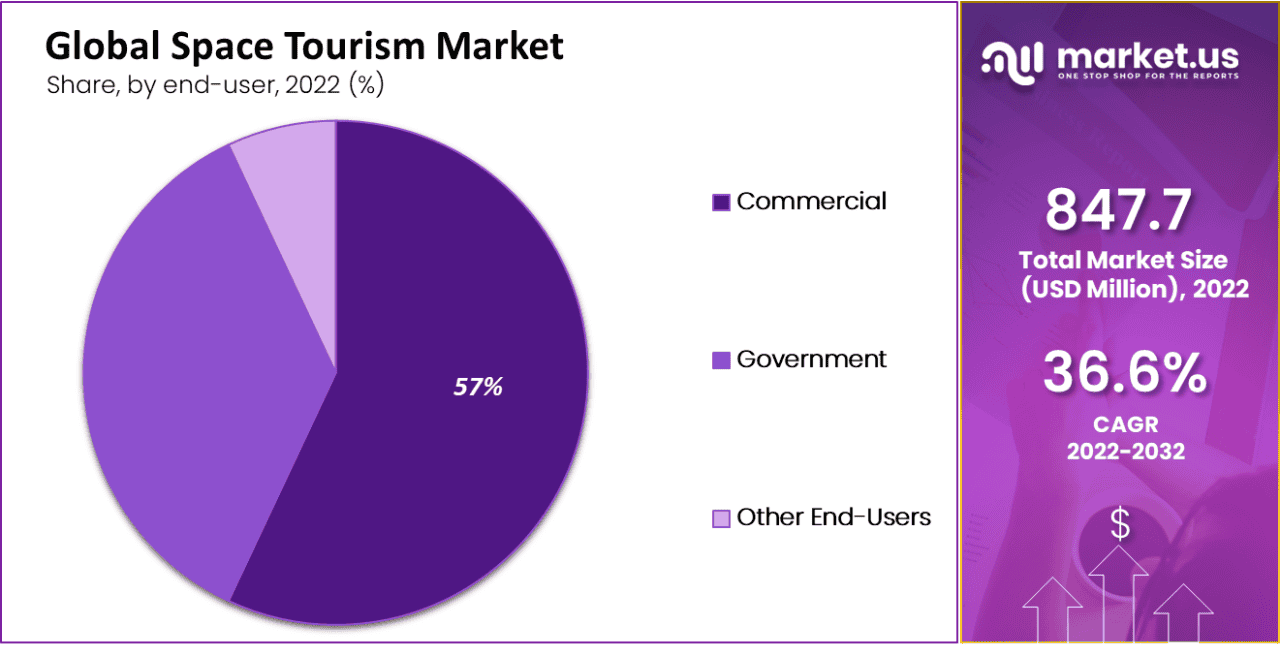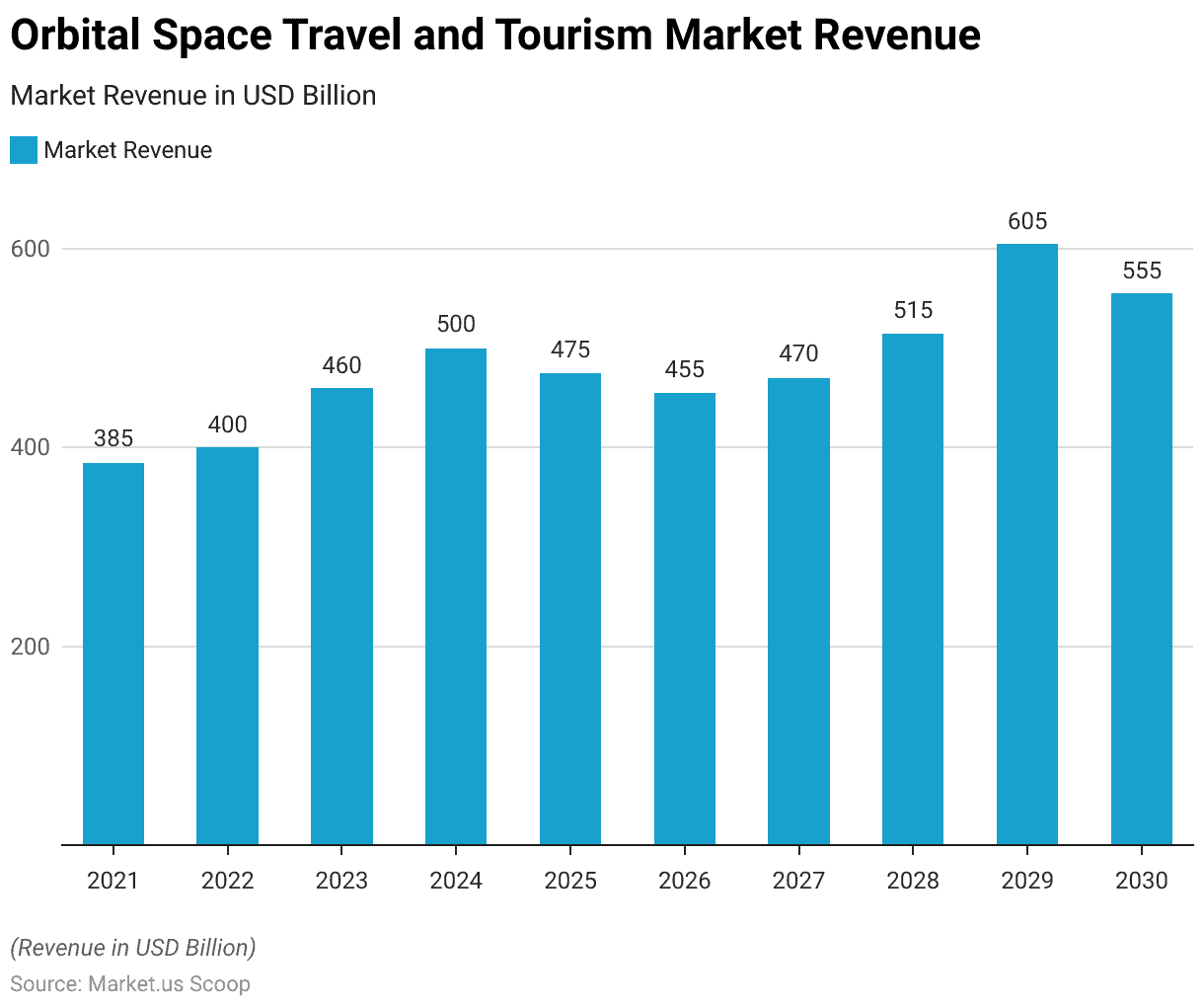Table of Contents
Introduction
According to Space Tourism Statistics, Space tourism represents a groundbreaking endeavor within the aerospace and travel sectors, allowing ordinary individuals to voyage into outer space. This enterprise involves the commercial conveyance of paying passengers beyond Earth’s atmosphere, affording them a distinctive experience of floating in microgravity, beholding breathtaking vistas of our planet, and participating in an unparalleled space journey.
Despite appearing as a recent notion, the origins of space tourism can be traced back to visionaries from the early 20th century, like Konstantin Tsiolkovsky, and gained traction during the Space Race era. In the early 2000s, the actualization of commercial space travel materialized with initiatives like SpaceShipOne, and more recently, enterprises like SpaceX, Blue Origin, and Virgin Galactic have competed to democratize space tourism, heralding a notable transformation in the industry’s landscape.
Editor’s Choice
- The space tourism market has witnessed remarkable growth in recent years, at a CAGR of 36.6%, with its revenue soaring to new heights.
- By 2027, the space tourism market is expected to surpass USD 4,162.3 billion, and this upward trajectory will continue throughout the following years, reaching a staggering USD 17,742.4 billion by 2032.
- In this dynamic industry, commercial entities dominate with a significant market share of 57%.
- SpaceX developed the Dragon spacecraft, the first commercial spacecraft to deliver cargo to the International Space Station (ISS) in 2012.
- On July 11, 2021, VSS Unity conducted its first fully crewed test flight, carrying Sir Richard Branson and other Virgin Galactic employees to the edge of space. This marked a significant milestone for the company.
- By 2030, the orbital space travel and tourism market is expected to yield approximately USD 555 million in revenue.
- Over 55% of American adults expect that in the next 50 years, it will become common for people to travel to space for tourism.

Space Tourism Market Size and Growth
Global Space Tourism Market Size
- The space tourism market has witnessed remarkable growth in recent years, at a CAGR of 36.6%, with its revenue soaring to new heights.
- In 2022, the market generated approximately USD 847.7 billion, marking a significant start to this nascent industry.
- This trend continued to escalate in 2023, with the market revenue surging to USD 1,158.0 billion, signifying a rapid expansion in consumer interest and investment.
- By 2027, the space tourism market is expected to surpass USD 4,162.3 billion, and this upward trajectory will continue throughout the following years, reaching a staggering USD 17,742.4 billion by 2032.
Space Tourism Market Size- By Type
- The global space tourism market has experienced remarkable growth in recent years, with revenue figures indicating its increasing popularity and economic significance.
- In 2022, the market generated a total revenue of USD 847.7 billion, with sub-orbital tourism contributing USD 446.7 billion and orbital tourism adding USD 401 billion to the overall figure.
- This growth trajectory persists, and by 2032, the market is forecasted to achieve a staggering total revenue of USD 17,742.4 billion.
- Sub-orbital tourism is anticipated to reach USD 9,350.2 billion, while orbital tourism is projected to account for USD 8,392.1 billion.
Global Space Tourism Market Size- By End-user
- The global space tourism market exhibits a diverse landscape regarding end-users and their respective market shares.
- In this dynamic industry, commercial entities dominate with a significant market share of 57%.
- These commercial players actively offer space tourism experiences to the public, catering to the growing demand for space travel adventures.
- In contrast, government participation in tourism is also substantial, capturing a market share of 36%.

Key Players in the Space Tourism Industry
SpaceX
- SpaceX, or Space Exploration Technologies Corp., was founded by Elon Musk in March 2002.
- The company is headquartered in Hawthorne, California, USA.
- SpaceX became the first privately funded company to send a liquid-fueled rocket into orbit in 2008 with the Falcon 1.
- The company successfully launched the Falcon 9 rocket, known for its reusability, reducing the cost of access to space.
- SpaceX developed the Dragon spacecraft, the first commercial spacecraft to deliver cargo to the International Space Station (ISS) in 2012.
- In 2020, SpaceX’s Crew Dragon spacecraft transported astronauts to the ISS as part of NASA’s Commercial Crew Program, marking a private company’s first crewed orbital launch.
- SpaceX is developing the Starship spacecraft, designed for missions to Mars and beyond. It’s intended to be fully reusable and capable of carrying many passengers.
- SpaceX has received significant investments, with an estimated over $100 billion valuation.
Blue Origin
- Blue Origin was founded by Jeff Bezos in 2000.
- The company is headquartered in Kent, Washington, USA.
- Blue Origin primarily focuses on the New Shepard suborbital rocket system, designed for space tourism and research missions. As of 2021, New Shepard had conducted multiple successful test flights, including crewed missions.
- Blue Origin unveiled plans for a lunar lander called “Blue Moon” in 2019. The lander is intended for missions to the Moon and is part of NASA’s Artemis program.
Virgin Galactic
- Virgin Galactic was founded by Sir Richard Branson in 2004.
- The company is headquartered in Las Cruces, New Mexico, USA, with operations at Spaceport America.
- Virgin Galactic’s flagship suborbital spaceplane is called SpaceShipTwo. It is designed to carry paying passengers on suborbital spaceflights.
- VSS Unity is the name of Virgin Galactic’s first SpaceShipTwo vehicle. It made several successful test flights before beginning its commercial operations.
- On July 11, 2021, VSS Unity conducted its first fully crewed test flight, carrying Sir Richard Branson and other Virgin Galactic employees to the edge of space. This marked a significant milestone for the company.
- Virgin Galactic operates its commercial spaceflight operations from Spaceport America in New Mexico, where SpaceShipTwo takes off and lands.
Orbital Space Tourism
Global Orbital Space Tourism Market Size
- The orbital space travel and tourism market has steadily grown in recent years.
- In 2021, the market generated approximately USD 385 million in revenue, indicating the beginning of commercial interest in orbital space travel experiences.
- This growth trend continued into 2022, with revenues reaching USD 400 million. Projections for the following years remain optimistic, with expected revenues of USD 460 million in 2023 and USD 500 million in 2024.
- The year 2030 is expected to yield revenue of approximately USD 555 million.

Consumer Demographics of Space Tourism
- Over 55% of American adults expect that in the next 50 years, it will become common for people to travel to space for tourism.
- About 35% of those surveyed expressed interest in going into space and orbiting the Earth in a spacecraft.
- However, 65% of respondents said they would not be interested in space tourism.
- Nearly 44% of the participants believe tourism will not become routine by 2073.
- The survey was conducted among 10,329 adults in the US between May 30 and June 4. It aimed to understand American attitudes toward space, including private space companies, NASA, and future space expectations.
- About 70% of Americans consider it essential for the United States to continue leading in space exploration, and 65% believe NASA should remain involved in space exploration despite the increasing involvement of private companies like SpaceX and Blue Origin.
Discuss your needs with our analyst
Please share your requirements with more details so our analyst can check if they can solve your problem(s)



